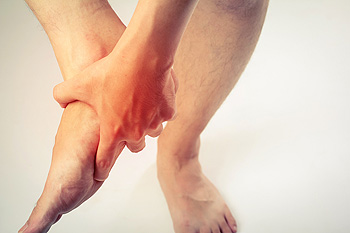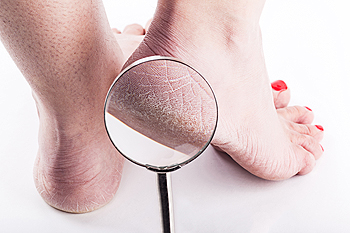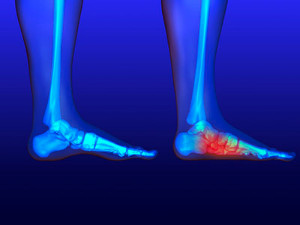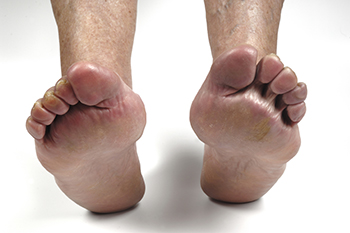






Plantar fasciitis, the inflammation of the tissue on the bottom of your foot, causes heel pain and discomfort and often worsens with physical activity. Risk factors include activities stressing your heel, being overweight, pregnant, or having high arches. Beyond heel pain, symptoms of plantar fasciitis include aching, burning, or swelling. This discomfort is typically most pronounced in the morning or after prolonged sitting, standing, or activity. Causes vary from playing sports to being on your feet a lot, poor arch support, or tight calf muscles. Treatment involves rest, wearing supportive footwear, using orthotics, and stretching the affected area. In severe cases, steroid injections or surgery might be considered. Prevention includes maintaining a healthy weight, wearing supportive shoes, warming up before exercise, and allowing recovery between physical activities. If you have heel pain and suspect you might have plantar fasciitis, it is suggested that you make an appointment with a podiatrist for a proper diagnosis and treatment.
Plantar fasciitis can be very painful and inconvenient. If you are experiencing heel pain or symptoms of plantar fasciitis, contact one of our podiatrists from Active Foot and Ankle Care, LLC. Our doctors can provide the care you need to keep you pain-free and on your feet.
What Is Plantar Fasciitis?
Plantar fasciitis is the inflammation of the thick band of tissue that runs along the bottom of your foot, known as the plantar fascia, and causes mild to severe heel pain.
What Causes Plantar Fasciitis?
How Can It Be Treated?
While very treatable, plantar fasciitis is definitely not something that should be ignored. Especially in severe cases, speaking to your doctor right away is highly recommended to avoid complications and severe heel pain. Your podiatrist can work with you to provide the appropriate treatment options tailored to your condition.
If you have any questions please feel free to contact our offices located in Fair Lawn, Riverdale, and Englewood, NJ . We offer the newest diagnostic and treatment technologies for all your foot and ankle needs.

Finding shoes that fit properly is important for foot health and overall comfort. Different shoe brands vary in fit, due to factors like material and construction. Incorrect sizing and improper shoe fittings can result in foot problems. Regular refitting is essential because feet change over time due to factors like aging, foot deformities, or pregnancy. In some cases ligaments lose elasticity, arches fall, and foot size changes. When fitting a shoe, measurements using a Brannock device determine length and width, but it is also important to consider your weight, the purpose of the shoe, and the materials from which it is made. Foot width ranges from AAA to 6E, and choosing the right width matters in order to prevent issues like neuromas, corns, or painful skin folding. Wearing improperly fitted shoes can exacerbate problems like pronation or supination. Experts suggest avoiding shoes that allow the toes to touch the front, which can lead to toe pain, bunions, or hammertoes. If you have problem feet and need guidance in finding the right shoes, it is suggested that you make an appointment with a podiatrist for more information.
Finding a properly-fitting shoe is important in reducing injuries and preventing foot problems. For more information about treatment, contact one of our podiatrists from Active Foot and Ankle Care, LLC. Our doctors will treat your foot and ankle needs.
Proper Shoe Fitting
A common concern when it comes to foot health, having properly fitted shoes can help prevent injuries to the foot. Out feet affect our posture and gait, which in turn affects the biomechanics and overall bodily structure. With 33 joints, 26 bones, and over 100 ligaments, the potential for serious injury is much greater than one realizes. Although the feet cease growth in adulthood, they still change shape as they mature. Here are some factors to consider when it comes to investing in proper fitting shoes:
Keeping in mind how shoes fit the biomechanics of your body, properly-fitting shoes are vitally important. Fortunately, it is not difficult to acquire footwear that fits correctly. Be sure to wear shoes that support the overall structure of your body. Do your feet a favor and invest in several pairs of well-fitted shoes today.
If you have any questions please feel free to contact our offices located in Fair Lawn, Riverdale, and Englewood, NJ . We offer the newest diagnostic and treatment technologies for all your foot and ankle needs.

With the warm weather upon us, we are eagerly pulling out our sandals and flip-flops. While this is a welcome trend in some respects, a downside is that it exposes cracked heels, an unsightly, sometimes painful, and potentially unhealthy condition. Wearing footwear such as sandals that expose the heels can lead to dry, cracked heels due to their lack of support and exposure to the elements. When our heels strike the ground while walking or running, the skin around them must be supple and flexible to move and stretch. Dryness and calluses hinder this flexibility, causing the skin to crack and split. To combat this condition, shoes with heel cups can be worn for better support and cushioning. Socks can also help prevent skin friction against the shoe's material. Hydrating well and moisturizing the feet regularly is particularly effective. If underlying causes for cracked heels, such as diabetes, contribute to cracked heels, they must be addressed to prevent recurrence. If you suffer from this uncomfortable ailment, it is suggested that you make an appointment with a podiatrist for a proper examination and individualized treatment.
Cracked heels are unsightly and can cause further damage to your shoes and feet. If you have any concerns, contact one of our podiatrists from Active Foot and Ankle Care, LLC. Our doctors can provide the care you need to keep you pain-free and on your feet.
Cracked Heels
Cracked heels appear unappealing and can make it harder for you walk around in sandals. Aside from looking unpleasant, cracked heels can also tear stockings, socks, and wear out your shoes. There are several methods to help restore a cracked heel and prevent further damage.
How Do You Get Them?
Dry skin is the number one culprit in creating cracked heels. Many athletes, walkers, joggers, and even swimmers suffer from cracked heels. Age and skin oil production play a role to getting cracked heels as well.
Promote Healing
Over the counter medicines can help, especially for those that need instant relief or who suffer from chronic dry feet.
Wear Socks – Wearing socks with medicated creams helps lock in moisture.
Moisturizers – Applying both day and night will help alleviate dryness which causes cracking.
Pumice Stones – These exfoliate and remove dead skin, which allows for smoother moisturizer application and better absorption into the skin.
Change in Diet
Eating healthy with a well-balanced diet will give the skin a fresh and radiant look. Your body responds to the kinds of food you ingest. Omega-3 fatty acids and zinc supplements can also revitalize skin tissue.
Most importantly, seek professional help if unsure how to proceed in treating cracked heels. A podiatrist will help you with any questions or information needed.
If you have any questions, please feel free to contact our offices located in Fair Lawn, Riverdale, and Englewood, NJ . We offer the newest diagnostic and treatment technologies for all your foot care needs.

Flat feet, a common condition among adults, occur when the arches of the feet collapse, leading to the entire foot making contact with the ground. While the majority of babies are born with flat feet, others develop this condition later in life, and several factors can contribute to adult-onset flat feet. Overpronation is a common cause of flat feet. This is an abnormal inward rolling of the foot while walking, often caused by muscle imbalances or improper foot structure. Trauma to the foot or ankle, such as fractures or ligament damage, can alter the foot's structure and also lead to flat feet. Aging can contribute to flat feet, as the ligaments and tendons lose elasticity, weakening the foot's arch support. People who are obese may notice their feet are flat, as a result of the stress that is placed on the feet from the added weight. Genetics and certain medical conditions can cause flat feet, including rheumatoid arthritis and nerve disorders. Understanding the causes of adult flat feet can aid in early detection and prompt intervention, ensuring better foot health in the long run. If you have flat feet, it is suggested that you are under the care of a podiatrist who can help you to manage this condition.
Flatfoot is a condition many people suffer from. If you have flat feet, contact one of our podiatrists from Active Foot and Ankle Care, LLC. Our doctors will treat your foot and ankle needs.
What Are Flat Feet?
Flatfoot is a condition in which the arch of the foot is depressed and the sole of the foot is almost completely in contact with the ground. About 20-30% of the population generally has flat feet because their arches never formed during growth.
Conditions & Problems:
Having flat feet makes it difficult to run or walk because of the stress placed on the ankles.
Alignment – The general alignment of your legs can be disrupted, because the ankles move inward which can cause major discomfort.
Knees – If you have complications with your knees, flat feet can be a contributor to arthritis in that area.
Symptoms
Treatment
If you are experiencing pain and stress on the foot you may weaken the posterior tibial tendon, which runs around the inside of the ankle.
If you have any questions please feel free to contact our offices located in Fair Lawn, Riverdale, and Englewood, NJ . We offer the newest diagnostic and treatment technologies for all your foot and ankle needs.

Rheumatoid arthritis is an autoimmune disease that causes inflammation in the joints. Because the feet have numerous joints, they are often a target for this disease. Tenderness, swelling, and stiffness in the joints are the major symptoms of rheumatoid arthritis or RA. Loss of range of motion and joint deformity are other symptoms. Foot deformities, such as bunions or hammertoes, can be caused by the erosion of the joints from RA. Because there is such a high risk of damage to the feet because of rheumatoid arthritis, it is wise to get a diagnosis sooner than later. Treatment can include medication, low-impact exercises, customized orthotics, and footwear recommendations. A podiatrist can fit the patient with orthotics built to fit the foot precisely and provide the necessary support and cushioning. For more information on how to deal with rheumatoid arthritis that is affecting the feet, it is suggested that you make an appointment with a podiatrist.
Because RA affects more than just your joints, including the joints in your feet and ankles, it is important to seek early diagnosis from your podiatrist if you feel like the pain in your feet might be caused by RA. For more information, contact one of our podiatrists of Active Foot and Ankle Care, LLC. Our doctors will assist you with all of your podiatric concerns.
What Is Rheumatoid Arthritis?
Rheumatoid Arthritis (RA) is an autoimmune disorder in which the body’s own immune system attacks the membranes surrounding the joints. Inflammation of the lining and eventually the destruction of the joint’s cartilage and bone occur, causing severe pain and immobility.
Rheumatoid Arthritis of the Feet
Although RA usually attacks multiple bones and joints throughout the entire body, almost 90 percent of cases result in pain in the foot or ankle area.
Symptoms
Diagnosis
Quick diagnosis of RA in the feet is important so that the podiatrist can treat the area effectively. Your doctor will ask you about your medical history, occupation, and lifestyle to determine the origin of the condition. Rheumatoid Factor tests help to determine if someone is affected by the disease.
If you have any questions please feel free to contact our offices located in Fair Lawn, Riverdale, and Englewood, NJ . We offer the newest diagnostic and treatment technologies for all your foot and ankle needs.






